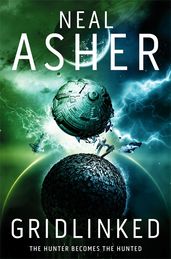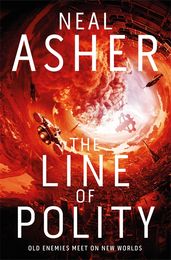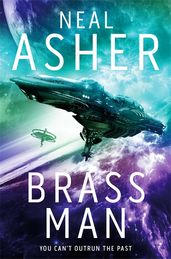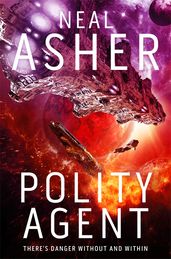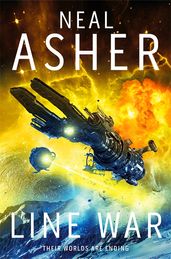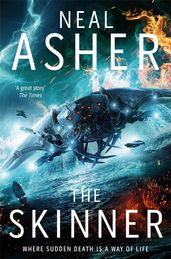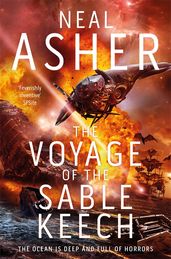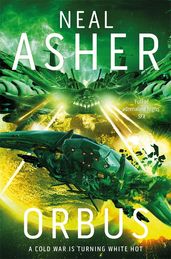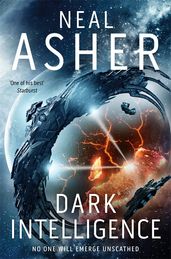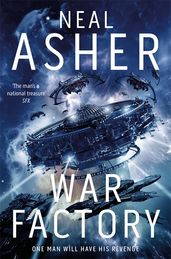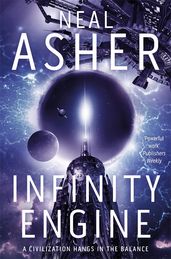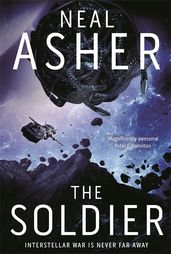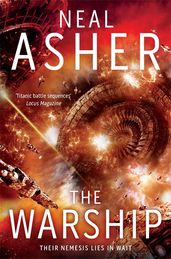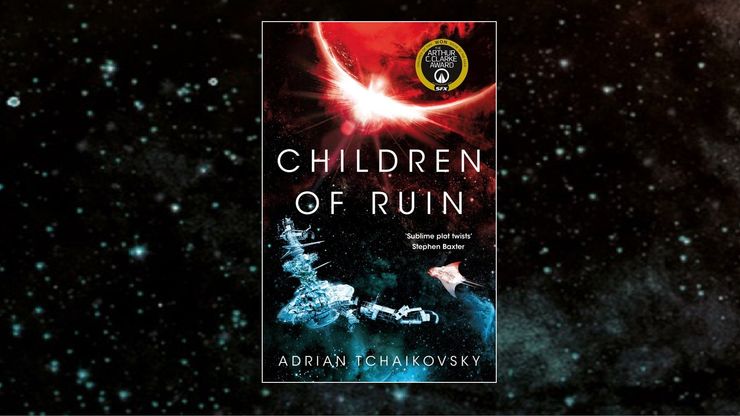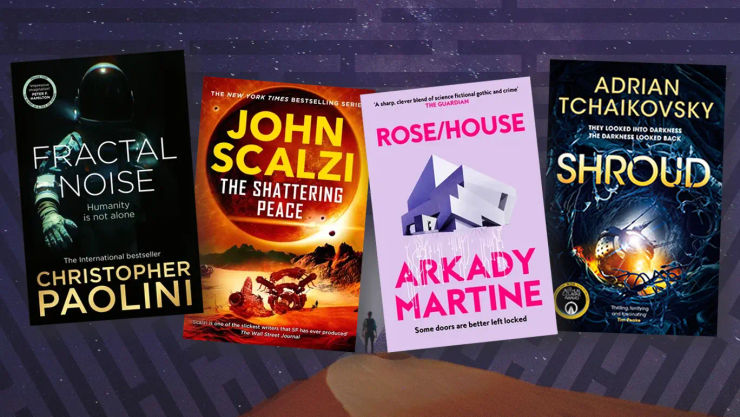An introduction to Neal Asher's Polity Universe books
Neal Asher is the author of fives series, seven standalone novels and a book of short stories set in the Polity Universe. Whether you’re new to Neal’s world or you’re already a fan, here he shares everything you need to know about Neal Asher's books.
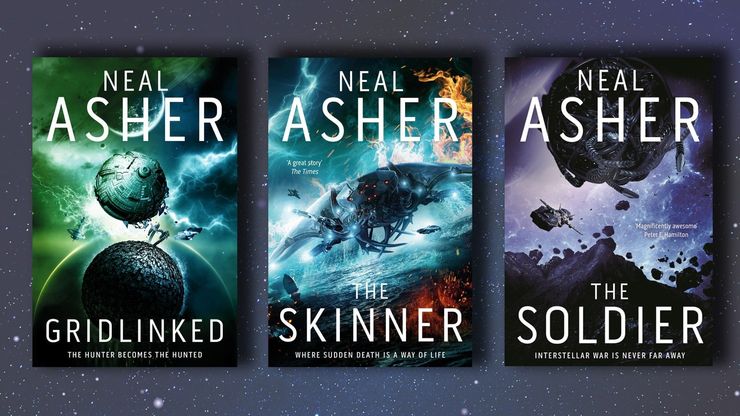
Neal Asher is the author of five series as well as numerous standalone novels and short stories, many set in his Polity Universe, a far-future society run by artificial intelligences. Here, Neal introduces the Polity Universe and its origins. Whether you’re wondering where to start with Neal Asher’s books, or you’re already a fan and want to know what to read next, here’s everything you need to know.
Discover our edit of the best sci fi books.
The Polity is a far-future society run by artificial intelligences. In the early years of space travel, as we spread out into the solar system, the political make-up of humanity is a mixture of national and world (or moon) governments, and large corporations. However, these separate political entities – polities – employ AI for gain. During this time Iverus Skaidon, a scientist, directly links his mind to the AI Craystein Computer and invents underspace travel, just before his mind blows like a fuse. The invention of this faster-than-light travel results in a diaspora from the Solar System.
Many groups head out to the galaxy, usually in cryogenic storage in their ships, to set up numerous colonies. Shortly after this, the AIs take over in a relatively bloodless coup known as the Quiet War. During a renaissance, the second wave of humanity, guided by the AIs, spreads out into the galaxy (quite often running into that first wave). Skaidon’s technology, whose naming template is based on the poems of Edward Lear, gives the nascent Polity the runcible: gateways for instantaneous travel between worlds.
The Polity started out in short stories in the small presses. I wanted a far future in which I could tell any story, and it grew organically without much in the way of a plan bar this. I create ecologies because the logic of the predator and its prey must be adhered to, though my preference is always for the most grotesque of the former. I visualize that ‘technology indistinguishable from magic’ and give it credence from heavy science reading. And I try to wrap all this up in stories you will enjoy and characters you’ll care about. Here then are some of the stories I’ve told in the ever-expanding Polity.
And I will be telling more.
On a final note: the Polity is not all of it. In the Owner trilogy I tell the story of a near-future and brutal dystopia, while in Cowl I venture into time-travel and a war across the ages between far-future humans, to the beginning of life of Earth.
Enjoy!
Neal Asher’s Polity Universe books in order
Agent Cormac series
Agent Ian Cormac works for the Polity, embarking on investigative missions throughout the universe. But during these investigations, he uncovers a larger threat. Ancient Jain technology provides individuals with great power, even as it takes control of them. This is especially dangerous when the individuals are disenfranchised AI war machines – drones and warships – who have developed contempt for humanity.
Gridlinked
by Neal Asher
Agent Cormac is sent to investigate a runcible disaster that killed thirty thousand people on the world of Samarkand, sinking it into an Ice Age. This was apparently caused by an alien entity called Dragon, a giant creature who might be older than human history – or a liar.
The Line of Polity
by Neal Asher
On the frontiers of human-occupied space, a space station has been destroyed. Suspecting the alien bioconstruct Dragon, Earth Central assigns Agent Ian Cormac to discover the truth. Meanwhile, civil war looms on the planet Masada, aided by lethal Jain technology.
Brass Man
by Neal Asher
An old nemesis of Agent Cormac resurfaces, along with the terrifying Mr Crane, a brass android killing machine. He journeys to the brutal world of Cull, tasked with hunting a ‘dragon’. There, he discovers its low-tech citizens are assisted by an entity calling itself Dragon – but Agent Cormac isn’t far behind.
Polity Agent
by Neal Asher
Time travelling refugees arrive in Polity, pursued by something alien and dangerous. Meanwhile, Orlandine, an augmented human, hopes to harness Jain technology – even though it could destroy her. But the lethal technology is spreading, and Agent Cormac is determined to stop it.
Line War
by Neal Asher
The Polity worlds are under attack. A renegade AI has merged with Jain technology to become more powerful than before. And it attracts the Polity’s most dangerous individuals: Mr Crane, seeking vengeance; Orlandine, who hunts a weapon; and Dragon, who is determined to wake the sleeping makers of Jain technology. Agent Cormac must risk everything to save the Polity.
Spatterjay trilogy
Many centuries after the war, the leech-infested planet named Spatterjay is not part of the Polity but is a ward of the same. Here, living sails drape the spars of primitive sailing vessels. Old Captains, stronger than Polity Golem, sail the seas and contemplate their endless lives, while the ancient war drone Sniper looks for action. And a complex virus wages war on the planet’s life forms, granting them immortality – and changing them forever.
The Skinner
by Neal Asher
On the savage ocean planet of Spatterjay, three travellers arrive. Erlin is immortal and seeks a reason to live. Janer hosts a hive mind – a tourist. And Sable Keech, a policeman who’s been dead for seven hundred years, but still hunts the notorious criminal Spatterjay Hoop. But their lives are disrupted, as a centuries-old prador arrives, to exterminate witnesses to his own war crimes.
The Voyage of the Sable Keech
by Neal Asher
Taylor Bloc is a dead man walking, desperate to gain the secret of immortality. So he travels to Spatterjay to discover its secrets, retracing Sable Keech’s journey across the wild seas. Erlin’s solitude is disrupted, while Janer returns with forbidden weaponry. And in the deeps, an alien prador stirs, horribly transformed by Spatterjay’s immortality virus.
Orbus
by Neal Asher
Old Captain Orbus flees Spatterjay, escaping violence. And his alien enemy, the prador Vrell, has also moved on after the immortality virus mutated him into something even more dangerous. They clash in the Graveyard, a lawless zone where the prador have seized a key space station. But their actions will awaken an ancient intelligence, capable of annihilating entire civilizations . . .
‘Neal Asher’s books are like an adrenaline shot targeted directly for the brain’
— John Scalzi, author of the Old Man’s War series
Transformation trilogy
The rogue AI Penny Royal, driven insane by orders no soldier should be forced to obey, is a dark presence in the Polity and the Graveyard. For payment, it transforms people into their ideal, but this is a cursed deal, as the transformations are grotesque. Thorvald Spear, resurrected after a hundred years, sets out intent on vengeance against this entity. But it seems Penny Royal might be atoning for previous sins. It follows a larger agenda, which leads back to the place where it lost its mind, and to a black hole.
Dark Intelligence
by Neal Asher
Thorvald Spear wakes in hospital, resurrected from a war that ended a century ago. Penny Royal, the rogue AI on a rescue ship, annihilated friendly forces in a frenzy of destruction – and it’s still free. So Spear hires Isobel Satomi, another of Penny Royal’s victims, to take him to the rogue AI’s last known whereabouts. But he cheats her in the process, sparking a quest for vengeance.
War Factory
by Neal Asher
Thorvald Spear is losing his mind, after Penny Royal links Spear with the stored personalities of those it’s murdered. He tracks it across a hostile starscape along with Sverl, an alien prador warped by the rogue AI. But Sverl’s prador enemies aren’t far behind. Enemies and allies converge on a defective war factory, Penny Royal’s goal – and birthplace.
Infinity Engine
by Neal Asher
Several forces now pursue Penny Royal, including swarm-robot AI Brockle – the most dangerous of them all. He upgrades himself, becoming ever more powerful in anticipation of a showdown. Meanwhile, Thorvald Spear, Sverl and an assassin drone struggle to survive the war factory. And beyond it, a black hole conceals a tantalising secret, one which could destroy the Polity.
Rise of the Jain trilogy
A corner of space swarms with Jain technology, a danger to all sentient life. Half AI, half human Orlandine has made it her life’s work to contain and eventually obliterate it. Dragon shares her vigil, but fears she is being manipulated by some alien intelligence. Meanwhile, Polity and prador fleets watch this sector of space, as neither can allow the other to claim its power. Things are about to change. The Jain might not be as dead as they seemed and interstellar war is just a heartbeat away.
The Soldier
by Neal Asher
Orlandine keeps vigil over lethal Jain technology. She is hatching a plan to obliterate it, removing the threat forever. But enemies seek to stop her by activating a Jain super-soldier, which may breach her defences. And while she continues her quest, the Polity and prador are watching, each waiting for the other to strike . . .
The Warship
by Neal Asher
Orlandine has destroyed the Jain super-soldier by deploying her weapon – a black hole. And now it hoovers up the lethal Jain technology within the accretion disc’s event horizon. But Earth Central and the prador king know Orlandine was tricked into releasing her weapon – and fear the Jain may be behind it.
The Human
by Neal Asher
The epic finale to the Rise of the Jain trilogy, The Human opens with the fate of an entire galaxy hanging in the balance. A Jain warship has risen from a five million year old prison, determined to catch an old enemy, and willing to destroy anything in its path. Orlandine must once again fight the seemingly unstoppable Jain and their ancient yet lethal technology, to save humanity, and herself.
‘Magnificently awesome. Then Asher turns it up to eleven’
— Peter F. Hamilton, author of Salvation and others, on Neal Asher's The Soldier
Time's Shadow trilogy
Neal Asher’s Polity Universe novels and short stories
